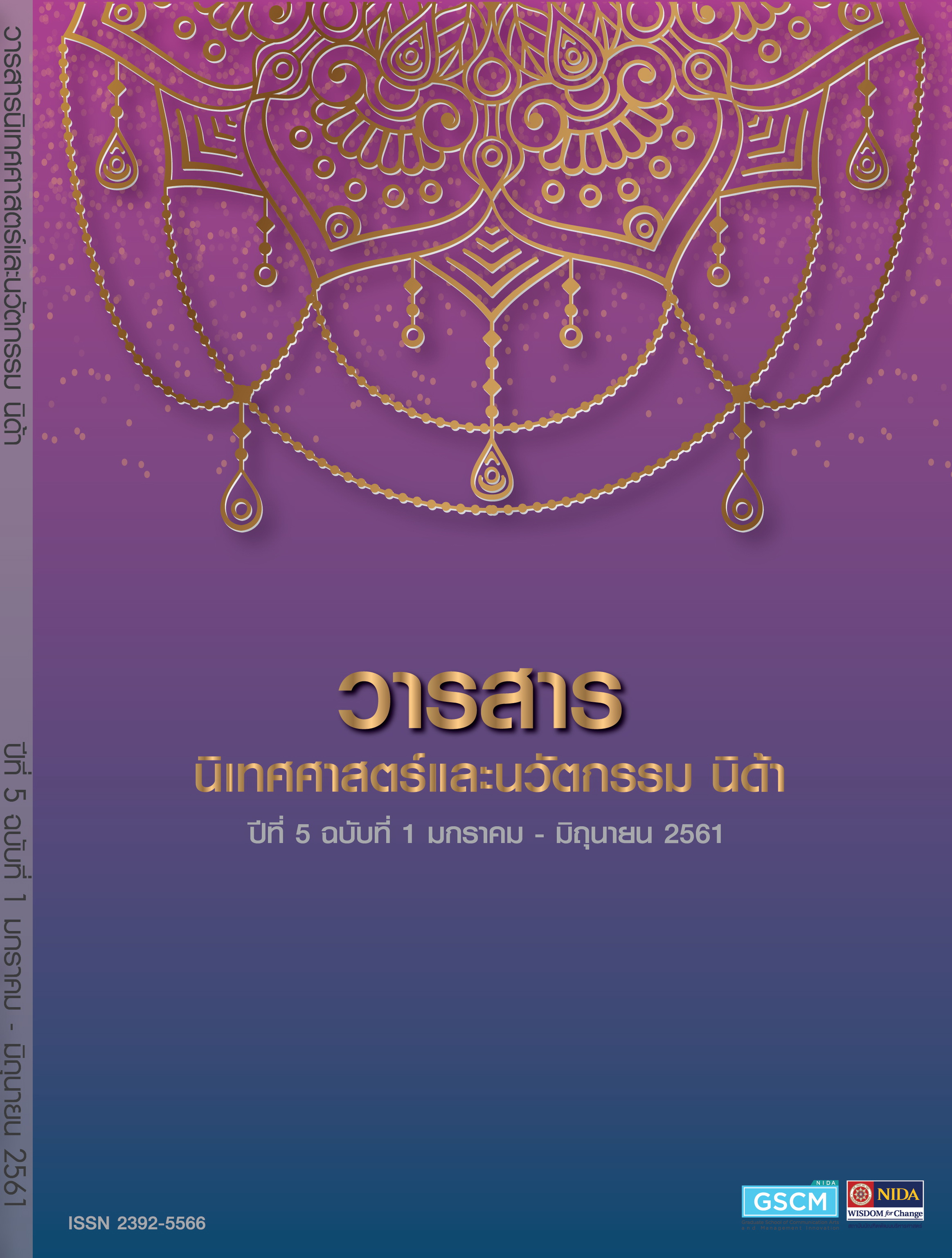Attitude Adjustment: National Council for Peace and Order’s Tool for Freedom of Expression Limitation
Main Article Content
Abstract
Since the 2014 coup by the National Council for Peace and Order (NCPO), many individuals who express their political view and journalists who investigate of the government have been summoned for talks and detained. Such treatment has been called “attitude adjustment” session which is authorized by the martial law and the Head of NCPO Order Number 3/2015 and 13/2016, granting the NCPO authority to detain people for up to 7 days. This article focuses on studying the process of the NCPO’s attitude adjustment and its impacts through in-depth Interviews of legal experts, journalists and those who underwent the session, and also collects media interviews of those whose went through the session. After an initial study into the process of the NCPO’s attitude adjustment session, from summoning to releasing, the researcher has found at least 8 patterns which are summoning, travelling, Physical examination/basic information, staying at a military camp, eating, talks/investigation, releasing and after releasing. On the impacts of the NCPO’s attitude adjustment session, the researcher has found three significant impacts -- the human rights violation of those who underwent the session, the suppression of freedom of political expression and the effects on the justice system.
Article Details
ข้อความและความเห็นในวารสารนิเทศศาสตร์และนวัตกรรม นิด้า เป็นของผู้เขียนแต่ละท่าน มิใช่ของคณะนิเทศศาสตร์และนวัตกรรมการจัดการ สถาบันบัณฑิตพัฒนบริหารศาสตร์
References
ชูวัส ฤกษ์ศิริสุข (สัมภาษณ์) 31 พฤษภาคม 2561.
ประจักษ์ ก้องกีรติ. (2558). ประชาธิปไตยในยุคเปลี่ยนผ่าน. กรุงเทพฯ: ฟ้าเดียวกัน.
พจนานุกรมศัพท์การเมืองไทยร่วมสมัย. (23 พฤษภาคม 2558). ความหมายปรับทัศนคติ. สืบค้นจาก https://www.facebook.com/thaipolitictionary/photos/a.289028981118666.72492.28301 2088387022/1044980875523469/?type=3&theater.
มติชนออนไลน์. (1 มิถุนายน 2559). คสช.แจงไม่เรียกปรับทัศนคติแล้ว ขอเลิกใช้คำนี้ เปลี่ยนเป็น‘พูดคุยทำความเข้าใจ’. สืบค้นจากhttps://www.matichon.co.th/politics/news_156317.
ยิ่งชีพ อัชฌานนท์ (สัมภาษณ์) 25 พฤษภาคม 2561
ศูนย์ทนายความเพื่อสิทธิมนุษยชน. (01 เมษายน 2559). 1 ปี คําสั่งหัวหน้าคณะรักษาความสงบ แห่งชาติ ที่ 3/2558 : “อำนาจพิเศษ” ในสถานการณ์ปกติ. สืบค้นจาก http://www.tlhr2014.com/ th/?p=1157.
ศูนย์ทนายความเพื่อสิทธิมนุษยชน. (20 มิถุนายน 2561). นิติรัฐที่พังทลาย: รายงาน 4ปี สิทธิมนุษยชนภายใต้ คสช. และผลพวงรัฐประหารต่อสังคมไทย ตอนที่ 3. สืบค้นจาก http://www.tlhr2014.com/th/?p=7861.
อรุณ ขยันหา. (2559). จากการปรับทัศนคติสู่วิกฤตการณ์การมีส่วนร่วมทางการเมืองของประชาชน. วารสารร่มพฤกษ์ มกราคม - เมษายน 2559.
แอมเนสตี้ อินเตอร์เนชั่นแนล. (15 พฤษภาคม 2561). สิทธิมนุษยชนคืออะไร?. สืบค้นจาก https://www.amnesty.or.th/latest/blog/62/.
โอฬาร เลิศรัตนดํารงกุล. (2559). ความคิดเห็นเกี่ยวกับการควบคุมการปฏิบัติงานของผู้สื่อข่าว ในยุครัฐบาลคณะรักษาความสงบแห่งชาติ. คณะวารสารศาสตร์และสื่อสารมวลชน มหาวิทยาลัยธรรมศาสตร์.
ไอลอว์. (13 พฤษภาคม 2558). รวมผลงาน การใช้อํานาจมาตรา 44 ตามรัฐธรรมนูญชั่วคราว. สืบค้น จาก https://www.ilaw.or.th/node/3679.
ไอลอว์. (10 เมษายน 2559). คำสั่งหัวหน้า คสช. ฉบับที่ 3/2558 กับ 13/2559: บทเรียนปัญหา อํานาจนอกระบบที่ตรวจสอบถ่วงดุลไม่ได้. สืบค้นจาก https://ilaw.or.th/node/4085.
ไอลอว์. (3 ธันวาคม 2560). ประกาศ คสช., คำสั่ง คสช. และคำสั่งหัวหน้า คสช. ต่างกันอย่างไร?. สืบค้นจาก https://ilaw.or.th/node/4690.
ไอลอว์. (10 มกราคม 2561). Attitude Adjusted?: "เหมือนจะทําให้เราบ้า” เจ็ดวันในค่ายทหาร ของวัยรุ่นที่ถูกกล่าวหาเป็น "แฮกเกอร์". สืบค้นจาก https://freedom.ilaw.or.th/blog/ attitude-adjusted-เหมือนจะทําให้เราบ้า”-เจ็ดวันในค่ายทหาร-ของวัยรุ่นที่ถูกกล่าวหาเป็น-แฮกเกอร์.


